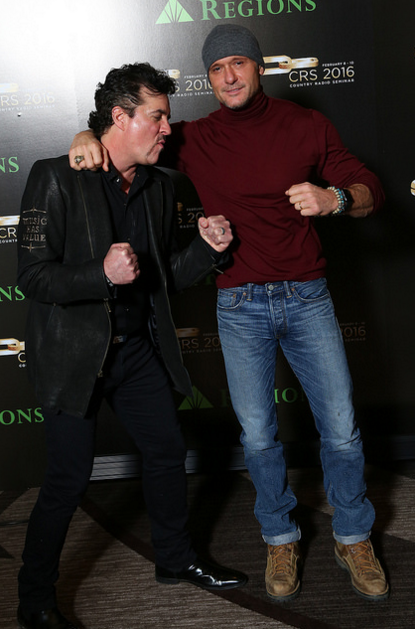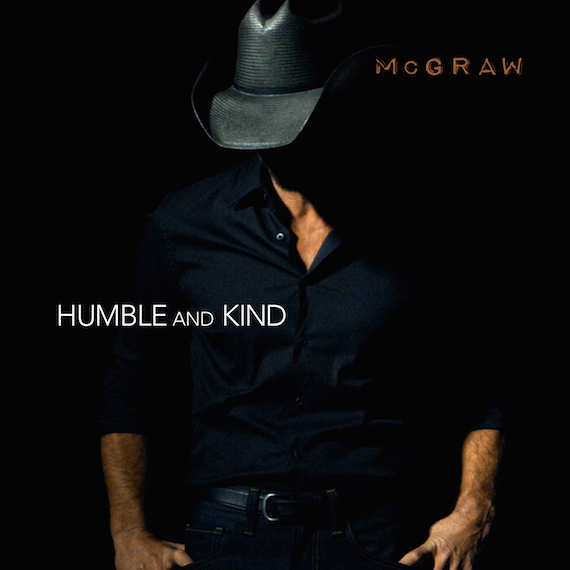

Tim McGraw with BMLG CEO and founder Scott Borchetta during CRS. Photo: AristoPR
In 1994, Tim McGraw was an enthusiastic newcomer with a slot on Country Radio Seminar’s coveted New Faces of Country Music show, on the strength of the Top 10 single, “Indian Outlaw.” Eager to win over country radio, McGraw performed the novelty song, then introduced to radio the heart-tugging ballad, “Don’t Take The Girl.”
“I knew I wanted ‘Don’t Take The Girl’ to be the second single, but it took me a while to get my head around doing ‘Indian Outlaw’ and ‘Don’t Take The Girl’ back to back. I almost didn’t do it, and at the last minute I decided to do it. It was just electric for me,” recalled McGraw.
Other artists on the bill that year at the New Faces of Country Music Show included Doug Supernaw, Clay Walker, Joy Lynn White, Lari White, Brother Phelps, Toby Keith, Gibson Miller Band, McGraw, and fellow newcomer Faith Hill.
“I think that night was probably the most important night in my career,” said McGraw. “That night set everything off for me.”
Now, more than 20 years later, the country superstar spoke about his enduring country career to the radio industry on Wednesday (Feb. 9), during an event at this year’s Country Radio Seminar. The interview was moderated by CW Scripps Co.’s Beverlee Branningan and All Access’s R.J. Curtis.
McGraw told the audience that trying to best his previous efforts each time he enters the studio, and crafting solid music are secrets to long-term success: “I feel a responsibility to make music that I’m proud of. You can’t think about what radio wants to hear and what your fans want to hear. If you start doing that, it might last for a little while, but sooner or later, that strategy isn’t going to work for you. If you don’t go in and try to please yourself as an artist and create stuff that you feel like you are beating yourself the last time you were in, if you don’t go in with that attitude, your strategy is flawed.”
The panel launched with a showing of the music video for McGraw’s current single, “Humble and Kind,” written by Lori McKenna, who penned “Girl Crush” for Little Big Town, “I Want Crazy” for Hunter Hayes, and “Fireflies” and “Stealing Kisses” for Faith Hill.
“Being a dad and having daughters—one just went off to college, and another goes off to college next year and my youngest daughter is starting high school—so you sort of look at the world at a different way than you would look at it without having kids, certainly kids who are going out on their own,” McGraw said of what drew him to the song. “So the song is a song that needed to be heard. I wasn’t sure if I was the one that was going to be able to say it, but luckily we found a way to make a record that spoke to the song.”
The video for the inspirational song features images from Oprah Winfrey’s Believe series. She endorsed the song via a tweet to her followers, which helped spur online views for “Humble and Kind” to more than 5 million views in less than 24 hours.
 McGraw also briefly spoke about power of social media in a music career—and his reservations about using the online medium. “When it’s fun and interesting and I feel like I have something to say, then that’s the time to say something. For the most part, I don’t want to do it every day. I just don’t think it means as much if you do. I’m old school. I was telling [BMLG President and CEO] Scott Borchetta earlier, I’m an analog guy in a digital world. I don’t quite get it but I understand how important it is and that I need to do more of it. I’m told constantly…I don’t know that I’m ever going to be a social media animal.
McGraw also briefly spoke about power of social media in a music career—and his reservations about using the online medium. “When it’s fun and interesting and I feel like I have something to say, then that’s the time to say something. For the most part, I don’t want to do it every day. I just don’t think it means as much if you do. I’m old school. I was telling [BMLG President and CEO] Scott Borchetta earlier, I’m an analog guy in a digital world. I don’t quite get it but I understand how important it is and that I need to do more of it. I’m told constantly…I don’t know that I’m ever going to be a social media animal.
“I can tell you I don’t have Twitter on my phone, because my wife won’t let me. There’s probably a good reason for that. When I have something to say, I send it to somebody and they do it.”
With success comes more opportunity, and McGraw has been wisely cautious about adding other creative outlets to his career.
“When you have some success people come at you asking you to do things. But after ‘Indian Outlaw,’ there were movie roles and TV roles and I didn’t want to do it. I had this notion in my head, that had I done something early on in my career, and just wasn’t very good at it, it could really hurt my career. So I wanted to make sure my music career was really pretty comfortable before taking a chance.”
Enter Ricky Schroder, who convinced McGraw to try acting in a small independent film, Black Cloud.
“I’m glad I did, because he taught me a lot. It was the first time I had ever been on a movie set and I got to do it away from the big studio glaring lights, and just learning in a small independent movie setting. I think had I not done that, I wouldn’t have been prepared for [the next role in] Friday Night Lights.”
McGraw may have felt more prepared for a movie role after Black Cloud, but convincing casting directors for Friday Night Lights to give him a shot at the role of alcoholic father Charles Billingsley was a greater challenge.
“They had already started casting when I read the script. I fell in love with the script. I called to try to get a reading for it. I tracked down [director] Pete Berg and he wasn’t going to let me read [for the part]. He didn’t know who I was, which turned out to be a good thing. So I flew down to Texas and went to his office and read and got the part. He called later and said I got the part. He said had he known who I was, he wouldn’t have given me the part,” McGraw said, laughing.
McGraw is still highly selective of movie roles, adding that he only has about two or three months every couple of years to dedicate to a movie project. “You are trying to make decisions. Sometimes you make good decisions and sometimes you make bad decisions. But you hope the scale at least tips in a good direction more times than not.”
Curtis praised McGraw’s commitment to fitness, while McGraw was quick to point out that the commitment has come only in recent years.
“I wouldn’t say I’ve always been in shape…have you seen Four Christmases?” replied McGraw.
For the singer, bettering his physical well-being became a catalyst for making changes in all areas of his life.
“I reached a point in my life…I drank too much for a while, my kids were getting older. You start thinking about mortality a little bit; you think about getting older, what’s your life going to be like? Career-wise, I thought I was at a point in my career where it was time to either give up and not try to be the best you can be, or to move forward and be the best that you can be. I felt a crossroads in my life on all fronts. I want to be healthier, I want to be around for my kids, I want to be a better husband, a better father, I want to take care of myself mentally and physically and I want to get the most out of my career.”
In 2011, McGraw was in a legal battle with Curb Records to get out of his previous recording contract. McGraw did not mention the legal battle specifically during his talk at the Country Radio Seminar, instead only hinting at what he called a career “roadblock” and “obstacle.” He said the challenging time became a catalyst for him to begin making changes.
“I wanted to control something, because I felt like it was getting out of control and all the things I had worked hard for, I couldn’t control. The first thing that I could grab and could control was my physical well being. That put me in a better mental state and a better competitive state and put me in a better position to really want to try and really work hard. It was like hitting the dominoes.
“I just feel responsible for making good music,” he said. “I don’t want to let myself down musically.”
Those changes poured into his professional and creative life as well. McGraw signed with Scott Borchetta’s Big Machine Label Group in 2012. Since then, he has hit another career stride with a string of hits, including “Highway Don’t Care” (featuring Taylor Swift and Keith Urban), as well as “Meanwhile Back at Mama’s.” “Diamond Rings and Old Barstools” is nominated for Best Country Song at the Grammy Awards on Monday, Feb. 15.

About the Author
Jessica Nicholson serves as the Managing Editor for MusicRow magazine. Her previous music journalism experience includes work with Country Weekly magazine and Contemporary Christian Music (CCM) magazine. She holds a BBA degree in Music Business and Marketing from Belmont University. She welcomes your feedback at jnicholson@musicrow.com.View Author Profile


